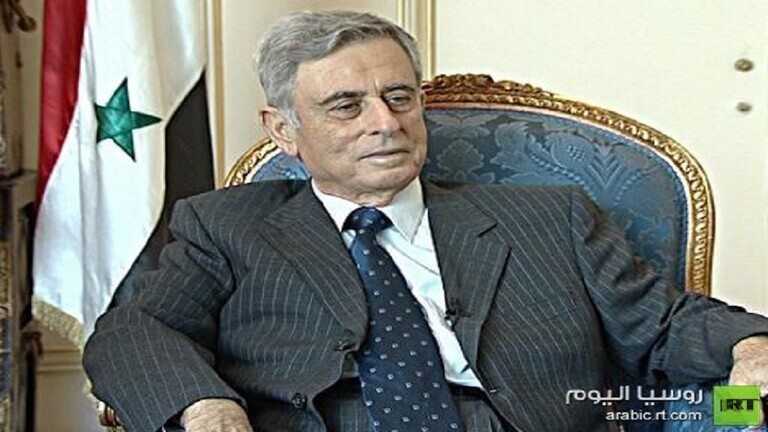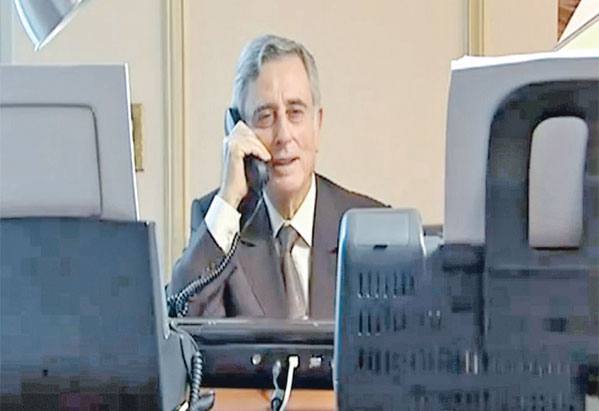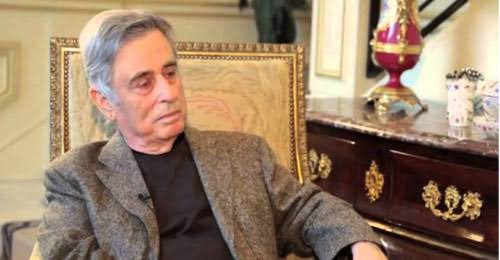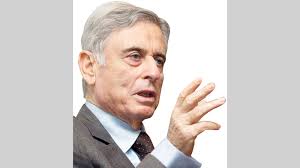In this timely interview, The Majalla speaks with Syria’s long-serving former vice president, Abdul Halm Khaddam, who served under both Hafez Al-Assad and Bashar Al-Assad and took part in many major events of Syria’s contemporary history. Now living in Paris, this prominent opposition figure discusses both the present crisis facing the state and its future. While Khaddam is optimistic about Syria’s future as a democracy able to overcome the current atmosphere of sectarian conflict, he concludes that West has so far failed to take substantive steps to help the Syrian people—to the benefit of the Assad regime, Iran, and Russia. He notes that with little cost, the West could decisively help Syria on its path towards democracy, and by doing so effectively end Iran’s position of influence in the Middle East.
Abdul Halim Khaddam was born in Baniyas, Syria on September 15, 1932. As a young member of the Ba’ath Party, he met Hafez Al-Assad, a member of the party and air force officer at the time. When Hafez Al-Assad came to power in 1971, Khaddam became one of the few Sunnis in Assad’s inner circle, and played an important role in consolidating Assad’s position within the Ba’ath Party and his rule over Syria. From 1970 to 1984, he served as Syria’s foreign minister and deputy prime minister. From 1984 to 2005, he served as vice president of Syria. From June 10 to July 17, 2000—after the death of Hafiz Al-Assad—he served as interim president while Bashar al-Assad prepared to assume power. Khaddam has been notably involved in Syria’s relations with the United States and its diplomacy with Israel, its relations with Iran, and also Damascus’ role in Lebanon. After resigning as vice president in 2005, Khaddam moved to Paris and established the opposition group, the National Salvation Front in Syria, in 2006. Since 2006, the organization has advocated for a political transition in Syria.
Majalla: With conflict going into its eighteenth month, do you see a way out of this deepening civil war?
Today, we have a regime whose weapon for repression is based on factionalism. It destroys all the people, the whole people. The Syrian regime—even in its war with Israel—never used airplanes. It’s now using the planes to hit the Syrian people in cities and in the countryside. The number of Syrians killed is between 40,000 to 50,000 people.
What is the future of Bashar Al-Assad? What are chances of an Alawite coup?
The fate of Bashar Al-Assad is already predestined: the regime is over. He is now fighting with guerillas called the Syrian army. Eighty-five officers or sub-officers are from his Alawite sect. He will meet the same fate as Muammar Qaddafi. The question now is whether the revolution will avenge the Alawites? This will not happen. No Alawite citizens will be harmed in any place in Syria. The Syrian people are aware of this and it will not lead to this. Once the regime falls, Syria will be a democratic country. A democratic state is one in which everyone takes part and contributes to. A new regime will not be for any particular sect. It will be nationalist for all Syrians.
What role do Iran and Russia play in the crisis?
The situation which the West does not understand is the reality now witnessed in the Middle East. In the Middle East, there is a country called Iran. Iran has great expectations and ambitions to influence its sphere of influence, which goes from Lebanon to Afghanistan. It’s spending most of its treasury on arms and arming to implement this strategy. Iran of course cooperates with Russia and China to help implement its strategy. Up until 1980 with the Iranian Revolution, Iran had no influence beyond its own country. It now controls Lebanon, Syria, part of the Palestinian movement, and Iraq. It succeeded in raising this fictional awareness of the Shi’ite against the Sunni.
The reality changed in Syria; loyalty now lies with Iran instead of Syria because of the sectarian nature of the Assad regime’s rule. Iran is seeking the support and help of Russia to veto anything against Iran in the UN Security Council. In the meantime, Russia has an interest in being a superpower through the Middle East. This is a way of coming back as a superpower. If Iran and Russia succeeded in foiling the Syrian revolution now, they have the whole control of the Middle East, especially in terms of oil. If the revolution succeeded in Syria, Iran would be finished in the Middle East not only in Syria but in Lebanon, Iraq, and Palestine. It will shrink in its internal boundaries, and therefore, its internal problems will come to the surface. If the West formed a military alliance to save the Syrian revolution, the cost would be minimal.
If Russia and Iran win in Syria and control the Middle East, particularly the oil, the West will be faced with two scenarios: either allow them to have control of the Middle East or go to war with Iran and this war will be very costly.
Do you see Lebanon being more stable if Syria becomes a democracy and Iran’s influence is pushed out of Syria?
Iran will get out of Lebanon if the Syrian revolution succeeded, even from Iraq. America gave Iran the influence in Iraq. Iran managed to deceive the American administration by pushing the Shi’ite parties in Iraq against Saddam Hussein in cooperation with the Americans. Even when the Americans went into Iraq, they formed this sort of government, most of the members of this government belonged in reality to Iran. They took the decisions of de-Ba’athification and dissolved the army. This led to the resistance against the Americans. So, Iran used the Shi’ite parties to help America against Saddam Hussein, and used these people to help the Americans. There is a very old saying, “If you have an enemy, don’t kill the enemy with your own hands, use the hands of others.” The same is done in Afghanistan.
After the invasion of Iraq in 2003, did Iran’s expanding position in Iraq threaten Syria’s position as well?
There was a sort of an agreement between Iran and Syria to recognize America’s position in Iraq. But when Colin Powel went to Syria and he threatened Bashar Al-Assad, this changed Assad’s thinking and he privately encouraged resistance under the able in a hush-hush manner against the United States.
Will there be an opportunity for a peace agreement with Israel after the fall of Assad?
It will be different, because the Syrian people want peace in rebuilding Syria; rebuilding what the regime destroyed.
What should the West do to help the Syrian people? Should there be no-fly zones?
The situation of the West is very strange. All of the Western governments denounced Assad’s regime and called for its fall, but in reality nothing concrete is done. The West is only supporting the Syrian people on the political front—but Russia is supporting Assad on the political scene and militarily, in addition to the Iranian support. At the beginning of the revolution, Syrian public opinion thought the West would interfere to support and protect the people and in Hama, they received the American and French ambassadors with flowers hoping that the West would interfere to help them with the fall of Bashar Al-Assad’s regime. Now, the public opinion is really shocked because of the West’s inaction. Bashar Al-Assad can send in his people every day against the Syrian people; such killings did not even move the conscience of people in the West an inch. Bashar Al-Assad go just because of a statement by one ambassador or another at the United Nations.




